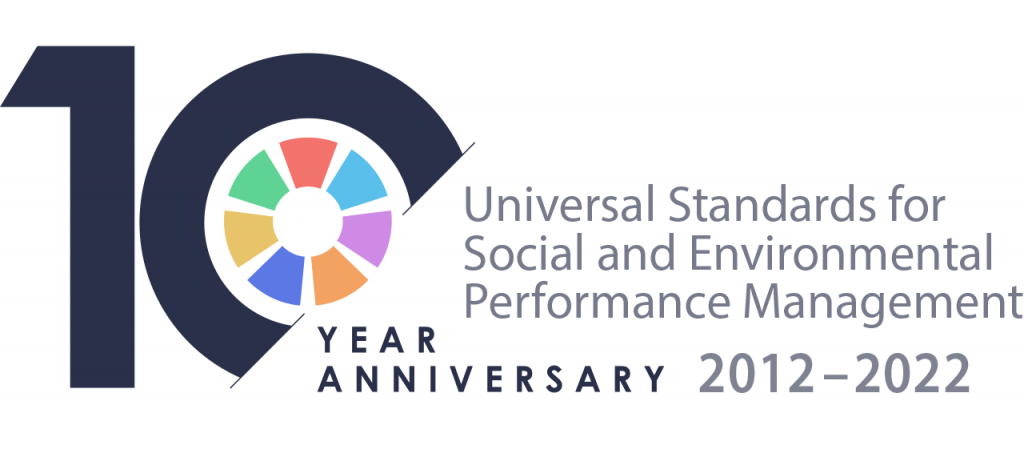
MESSAGE FROM OUR
EXECUTIVE DIRECTOR
Laura Foose
When we founded the Social Performance Task Force in 2005, we had a simple goal—not easy, but simple. We wanted microfinance to apply the same rigor to both sides of its “double bottom line.”
Microfinance claimed to have a financial bottom line and a social bottom line, but it only measured one of them consistently. And as the saying goes, what matters gets measured. So a broad-based group—donors, providers, networks, rating agencies, and more—came together to form the Task Force. We wanted to develop a set of standards that would be to social performance what Generally Accepted Accounting Principles, or the International Financial Reporting Standards, are to financial performance: universally accepted, comparable, meaningful, and clear. This work was not imposed by any single entity. It was not a damage control response to crises: crucially, as it would turn out for the work’s credibility, the effort was already well underway before the controversial IPOs of the mid-2000s or the client over-indebtedness in South Asia in 2010.
Instead, the Task Force was a group of stakeholders determined to see that microfinance walked the talk, and prepared to do the hard work to help make that happen. Because we knew the work would be hard, we did not put a clock on it. We encouraged every stakeholder, in every country, to join the effort and lend a voice. It took years of painstaking and protracted collaboration.
But in 2012, the Social Performance Task Force released the Universal Standards for Social Performance Management. Incredible as it seems 10 years have already gone by.
In the past decade, the Universal Standards have helped transform the landscape. They have been put into practice by financial service providers whose accumulated loan portfolio represents about $40 billion and 62 million borrowers from 99 different countries. They have had market-systems impact, as countries such as Philippines use the Universal Standards as the reference point for the regulatory regime overseeing microfinance. And beyond our industry, the Universal Standards provide valuable lessons learned. As other sectors struggle with defining and measuring non-financial standards, our experience shows what is possible when tenacious people commit themselves to the task.
The Social Performance Task Force will be writing and reflecting on the lessons learned from the first 10 years of the Universal Standards. We will also be hearing from members sharing their own thoughts. Please enjoy and share the videos on this page, and be inspired by their messages.
And send us a message of your own! It does not need to be fancy—just hit the “record” button on your phone or laptop and say a few words about how the Universal Standards have shaped your work. We’ll compile them by the end of 2022, and maybe have a few surprises along the way, too.
On behalf of all of us on the board and staff: thanks for an incredible 10 years, and here’s to the next decade.
MESSAGES OF CONGRATULATIONS TO THE SOCIAL PERFORMANCE TASK FORCE ON THE 10TH ANNIVERSARY OF THE UNIVERSAL STANDARDS FOR SOCIAL AND ENVIRONMENTAL PERFORMANCE MANAGEMENT.
Global CEO, FINCA Impact Finance
on SPTF’s work to develop the Universal Standards
Part 1
Global CEO, FINCA Impact Finance
sur les travaux de la SPTF dans le développement des Normes Universelles
Part 1 FRENCH
General Manager. Fundación Génesis Empresarial
Member, SPTF Board of Directors
Part 3
Executive Director
Microfinance Council of the Philippines, Inc. (MCPI)
Part 4
Executive Director
Microfinance Council of the Philippines, Inc. (MCPI)
A before-and-after example from the Philippines of social performance management in action.
Part 5
Senior Investment Manager
Nordic Microfinance Initiative
Part 6
Directrice Générale Adjointe
FIDRA
Part 7
Directrice Générale
Réseau MUCREFAB
Part 8
Responsable des Programmes
l’Association Professionnelle des Systèmes
Financiers Décentralisés de Côte d’Ivoire (APSFD-CI)
Part 9
Directeur Général
Groupe d’Epargne et de Soutien en Côte d’Ivoire (GES-CI)
Part 10

